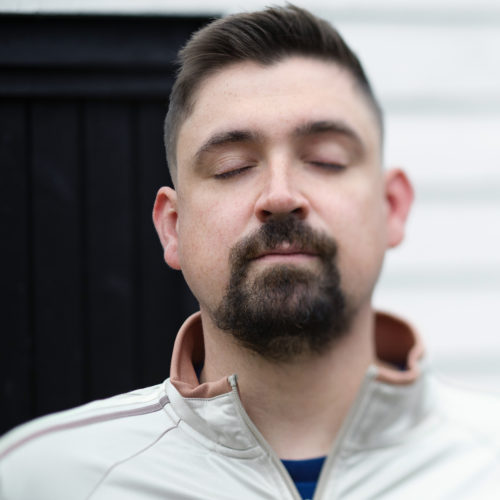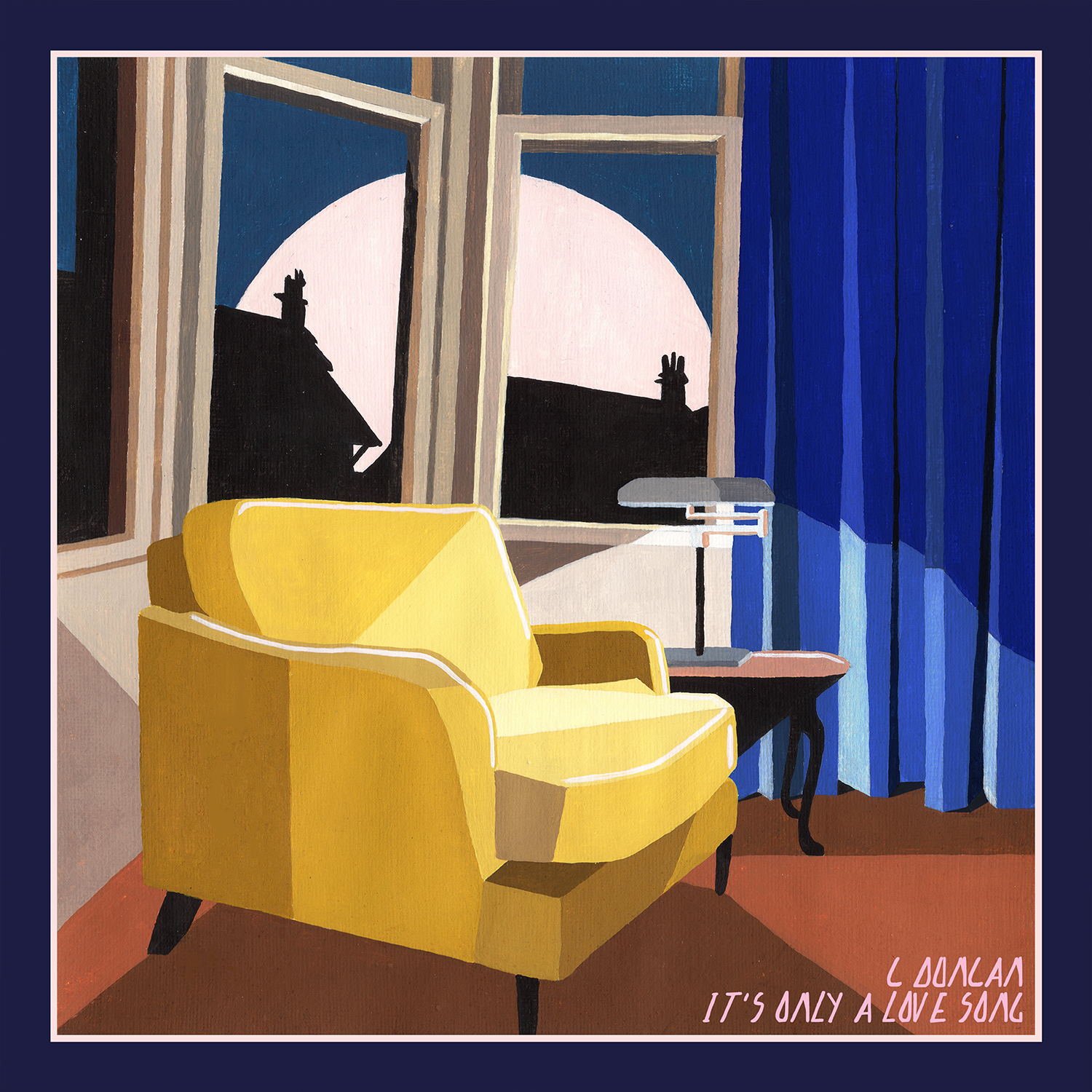
It’s Only a Love Song
—
Out January 24, 2025
—
Bella Union



“I love the idea of something being so romantic that it almost hurts,” says C (for Chris) Duncan of the music he adores. Glasgow’s classically trained multi-instrumentalist and singer-songwriter honours that idea with tremendous reserves of panache and feeling on his fifth album, It’s Only a Love Song, released through Bella Union on xxx xxxx 2024. Flushed with swooning strings, enraptured images, classicist melodies and dreamy harmonies, it’s a record of orchestral pop romanticism at its most sublime: one from the heart, warmed by a deep ache of constant yearning.
Previously, on 2022’s Alluvium, Chris had treated his wide-ranging stories as fertile soil for a record of multi-stranded tones and styles. It’s Only a Love Song is closer to a song suite, at once immaculately sequenced, lavishly arranged, and anchored in personal experiences of love – notably, Chris and his long-term partner recently married – and loss.
As he explains, “I’ve been wanting to do a record that is unashamedly romantic and slightly old-timey. Quite a lot of my stuff has a hint of that, but this one is more kind of 1970s, with the string arrangements and a sort of warmth sprinkled on top. And whereas Alluvium had the space to meander off into its own areas, with this one I thought more about pace and how each song could go into the next one. There is more of a theme – it’s a highly romantic record, which then goes from that into dealing with the loss of friends and relatives.”
Written first, the title-track – “A love song about love songs,” he says – and the old-Hollywood-style closer ‘Time and Again’ set parameters for the record’s themes, moods and tones. ‘It’s Only a Love Song’ unfurls from a piano overture with pillowy grace, before a buoyant melody lifts the chorus into a paean to unquenchable, unresolved desire. Written for Chris’s husband, ‘Lucky Today’ follows in transporting style, its elevating strings and harmonies framing a lyric about standing on a mountain and observing paradise. As Chris says, “I wanted to take it into that sort of James Bond world – something like Louis Armstrong’s ‘We Have All the Time in the World’.”
The cinematic influences extend to the harpsichord of ‘Triste Clair de Lune’, which evokes 60s French cinema and pop alongside more poetic inspirations. “I read a lot of French Symbolist poetry,” says Chris. “That’s really up my street, just the language and the meaning that’s attributed to the tiniest of things. The song is about the moon losing a part of itself that floats down to earth, and this exquisite light being found by humans. And all the stars above lamenting the loss of this light.”
In a record of songs in dialogue with one another, the hushed, harmonious ‘Worry’ and misty-eyed ‘The Space Between Us’ reflect on that sense of loss. ‘Think about It’ follows in an upbeat sweep, its lyrics urging optimism and decisiveness from within the liminal zone of uncertainty. A further near-coupling of songs follow, studies in feeling both. The lilting ‘Delirium’ sets a reflection on a time of huge stress to an ameliorating arrangement: “The music for it is like a tonic to that madness I was feeling – it just kind of lopes along,” says Chris. ‘Sadness’ reflects on the death of a friend as lockdown began, touching on feelings of grief that were difficult to process in those tumultuous times. The lounge rush of ‘Surface of a Fantasy’ then ushers the record towards a moonlit climax, where ‘Time and Again’ succumbs to the heart’s eternal longings over an exquisite piano refrain.
An expansive beauty of an album, the record is made all the more extraordinary by its homegrown gestation. Duncan wrote and played most of it himself at his home studio (he also did the artwork) in Helensburgh, an experience suited to his sense of care and craft. “If you want to spend ages working on one tiny sound and then do a broad sweep of something else, it doesn’t matter because the time is yours. I’m not paying for studios, which works for me because I go from having intense periods of working to spending ages making a snare drum sound a bit nicer. It’ll take days to do, but it’s good.”
Meanwhile, his parents – retired classical players both – contributed strings. Chris played most of the strings on Alluvium, though he describes his viola-playing as “pretty dodgy… low and slow”. This time, his “high, soaring” ambitions called for more far-reaching solutions: “My dad loves playing violin, so I thought, all right, I’ll share some of the performing with people who can do better.”
The result is Duncan’s most lush release, and a fresh peak in a dazzling creative arc. Born in Glasgow, he played in school bands before studying music composition at the Royal Conservatoire of Scotland. His haunting debut album, Architect (2015), banked a Mercury Music Prize nomination; its follow-up, the Twilight Zone-inspired The Midnight Sun (2016), reached the shortlist for the Scottish Album of the Year. A tour with Elbow then beckoned, after which Duncan recorded the richly melodic Health (2019) at Elbow’s Salford studio with Craig Potter. Another entry on the shortlist for Scottish Album of the Year came accompanied by effusive reviews: throughout his career, Duncan has banked raves from The Guardian, NME, Mojo, Uncut and others, alongside much love from BBC Radio 6 Music.
Besides support slots with Belle & Sebastian and The Blue Nile, Chris went on to fill venues in his own name, including London’s Union Chapel and Scala. Another career development beckoned in 2020 via a collaboration with Bella Union’s Simon Raymonde for the Lost Horizons project on the song ‘Circle’, prefiguring the effortless-seeming breeziness of Alluvium.
It’s Only a Love Song is his next great leap forward, a heartfelt valentine to romance with its head in the heavens and its sweep in the cinema stalls. Alongside The Carpenters and Scott Walker, declared influences range from Michel Legrand to Bernstein’s West Side Story and the films of Jacques Demy, whose The Umbrellas of Cherbourg boasts music to make hearts sing. “It’s almost hyper-romantic, which I love,” explains Chris: “That way in music where you get to a point where your heart can’t actually take anymore.” Radiant and rapturous, It’s Only a Love Song takes you right there.